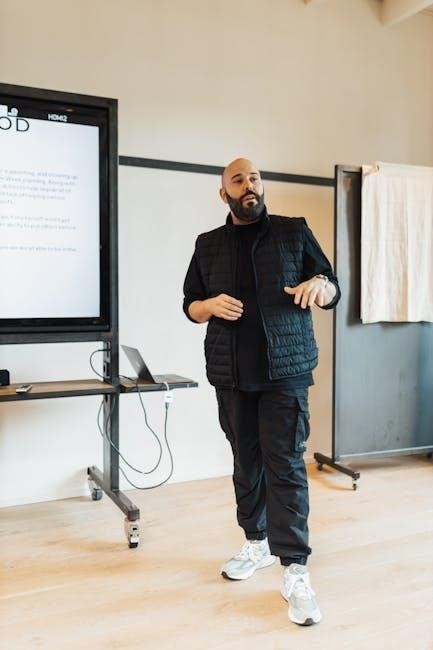An instructional coach is an educator who supports teachers in improving their instructional practices, fostering collaboration, and enhancing student learning through personalized strategies and goal-oriented coaching.
Overview of Instructional Coaching
Instructional coaching is a collaborative, goal-oriented process where coaches support teachers in enhancing their instructional practices. It focuses on improving teaching effectiveness and student learning outcomes through personalized strategies, professional development, and feedback. Coaches work closely with educators to identify strengths, address challenges, and implement evidence-based methods. This approach fosters a culture of continuous improvement, adaptability, and shared responsibility in educational settings.
Definition and Role of an Instructional Coach
An instructional coach is an educator who supports teachers in enhancing instructional practices, developing strategies, and improving student learning through collaboration, feedback, and professional growth opportunities.
What is an Instructional Coach?
An instructional coach is an educator who collaborates with teachers to enhance teaching practices, improve student outcomes, and foster professional growth. They provide personalized support, set coaching goals, and use data-driven approaches to inform instruction. Coaches help teachers navigate curriculum changes, develop strategies, and reflect on their practice, ensuring alignment with educational standards and fostering a growth-oriented school culture.
Distinguishing Instructional Coaches from Other Educational Roles
Instructional coaches differ from other roles like mentors or consultants by focusing on collaborative, ongoing professional development. Unlike administrators, their primary role isn’t evaluative but supportive, helping teachers refine practices. They are not classroom teachers but work alongside them, using data and observation to guide improvement. This unique position allows coaches to bridge the gap between educational theory and practical application, fostering teacher growth and student success.

Roles and Responsibilities
An instructional coach supports teachers in enhancing their instructional methods, develops effective teaching strategies, and monitors progress to foster continuous improvement in educational practices and student outcomes.
Supporting Teachers in the Classroom
Instructional coaches assist teachers by modeling lessons, providing resources, and offering feedback to enhance teaching strategies. They help navigate curriculum changes, create classroom structures for new teachers, and support differentiated instruction. Coaches also aid in developing activities for advanced learners and addressing challenging student behaviors. By fostering collaboration and personalized approaches, they ensure teachers feel supported in creating engaging and effective learning environments for all students.
Developing and Implementing Teaching Strategies
Instructional coaches help teachers design and refine teaching methods, such as differentiated instruction and personalized learning approaches. They assist in aligning lessons with curriculum goals and provide resources to enhance classroom practices. Coaches also collaborate with teachers to implement innovative strategies, ensuring they are tailored to student needs and promote meaningful learning experiences. This support enables educators to adapt and improve their teaching techniques effectively.
Monitoring Teacher Progress and Providing Feedback
Instructional coaches monitor teacher progress by observing classroom practices and analyzing data to identify strengths and areas for growth. They provide constructive feedback that is specific, actionable, and aligned with coaching goals. This iterative process helps teachers reflect on their practices, refine their strategies, and enhance student outcomes. Regular check-ins and data-driven insights ensure continuous improvement and professional growth for educators.
Benefits for Teachers and Schools
Instructional coaching enhances teacher effectiveness, improves student learning, fosters collaboration, and supports professional growth, creating a positive impact on school culture and educational outcomes.
Enhancing Teacher Effectiveness
Instructional coaches help teachers set and achieve professional goals, providing personalized support to refine teaching strategies and improve classroom practices. By offering constructive feedback, modeling techniques, and encouraging reflection, coaches empower educators to adopt innovative methods, enhancing their instructional skills and confidence. This collaborative approach fosters continuous improvement, leading to more effective teaching and better student outcomes, ultimately strengthening the overall quality of education.
Improving Student Learning Outcomes
Instructional coaches play a pivotal role in enhancing student learning by aligning teaching strategies with student needs. Through personalized learning approaches, coaches help teachers implement effective techniques, fostering a student-centered environment. By setting clear goals and using data-driven methods, coaches ensure that instructional practices are refined to boost academic performance, engagement, and overall student success, creating a meaningful impact on educational outcomes.
Fostering a Collaborative School Environment
Instructional coaches foster collaboration by encouraging teamwork among teachers, administrators, and staff. By facilitating professional development and joint planning, coaches create an inclusive culture where educators share ideas and strategies. This collaborative approach not only strengthens teacher relationships but also enhances schoolwide communication, leading to a more cohesive and supportive educational environment that benefits both students and staff alike.

Building Relationships
Building strong relationships is foundational to instructional coaching, fostering trust, collaboration, and mutual respect between coaches and teachers to create a supportive and productive learning environment.
Establishing Trust with Teachers
Establishing trust with teachers is crucial for effective instructional coaching. Coaches must demonstrate empathy, active listening, and a non-evaluative stance to create a safe environment for collaboration. By fostering open communication and respecting teachers’ expertise, coaches build credibility and mutual respect, which are essential for meaningful professional growth and improved teaching practices.
Effective Communication Strategies
Effective communication is vital for instructional coaches to connect with teachers. Active listening, clarity, and adaptability are key strategies. Coaches should tailor their communication to meet individual teacher needs, fostering a collaborative and supportive environment. Regular, open dialogue helps build trust and ensures that coaching efforts align with teacher goals, leading to meaningful professional development and improved classroom practices.
Methods and Strategies
Instructional coaches use personalized learning approaches, coaching models, and data-driven techniques to support teachers. They set clear coaching goals and provide actionable feedback to enhance teaching practices.
Personalized Learning Approaches
Instructional coaches use personalized learning approaches to tailor support for individual teachers, focusing on their specific needs and goals. Coaches help teachers identify areas for improvement and develop customized strategies. This includes creating personalized lesson plans, analyzing data, and implementing targeted interventions. Personalized learning fosters a collaborative environment where teachers can grow professionally, leading to improved teaching effectiveness and enhanced student learning outcomes.
Coaching Models and Techniques
Instructional coaches employ various coaching models, such as the Impact Cycle and Partnership Principles, to guide teachers. Techniques include co-planning lessons, observing classrooms, and providing constructive feedback. Coaches also use data-driven strategies and reflective practices to help teachers refine their methods. These approaches ensure tailored support, fostering professional growth and improving instructional effectiveness while maintaining a collaborative and non-evaluative relationship with educators;
Challenges Faced by Instructional Coaches
Instructional coaches face challenges balancing varied teacher needs, addressing resistance to change, and navigating the fine line between supporting and pushing teachers to improve.
Navigating Varied Teacher Needs
Instructional coaches face the challenge of addressing diverse teacher needs, as educators vary in experience, teaching styles, and readiness for change. Coaches must adapt their strategies to support both novice and veteran teachers, balancing individualized attention with school-wide goals. This requires empathy, flexibility, and the ability to tailor approaches to meet unique classroom contexts, ensuring equitable support while managing time effectively to cater to the wide range of demands.
Handling Resistance to Change
Instructional coaches often encounter resistance from teachers who are hesitant to adopt new methods. Building trust and fostering open communication are key strategies to address this. Coaches must listen actively to concerns, provide evidence-based practices, and involve teachers in decision-making. Celebrating small successes and offering ongoing support can help ease skepticism and encourage a growth mindset among educators, ultimately promoting a culture of collaboration and continuous improvement in teaching practices.

Training and Qualifications
Instructional coaches often undergo specialized training, such as programs by Jim Knight or Marzano, and may hold advanced degrees. Key skills include leadership, communication, and data analysis.
Professional Development for Coaches
Professional development for instructional coaches often includes training programs like those by Jim Knight, Marzano, or Model Schools. These programs focus on setting coaching goals, data-driven practices, and fostering collaboration. Coaches learn strategies to support teachers effectively, emphasizing personalized learning and student-directed curriculum. Continuous development ensures coaches stay updated on teaching methodologies, enabling them to provide impactful support and enhance educational outcomes. This training is essential for their effectiveness in schools.
Key Qualifications and Skills
Instructional coaches must possess strong communication and interpersonal skills to build trust with teachers. They need expertise in teaching methodologies, data analysis, and problem-solving. Empathy, patience, and the ability to navigate diverse teacher needs are crucial. Coaches should also have leadership qualities to guide without formal authority. Professional qualifications often include specialized training in coaching models and educational frameworks, ensuring they can effectively support teachers in enhancing instructional practices and student outcomes.
Impact on Education
Instructional coaching transforms teaching practices, enhancing educator effectiveness and student outcomes. It fosters a culture of continuous improvement, elevating the quality of education and leadership in schools.
Transforming Teaching Practices
Instructional coaches play a pivotal role in transforming teaching practices by helping educators adopt innovative methods, integrate technology, and refine their skills. Coaches work collaboratively with teachers to design engaging lessons, implement evidence-based strategies, and align instruction with student needs. By focusing on personalized learning and data-driven approaches, coaches empower teachers to create impactful learning experiences, fostering a culture of continuous improvement and student-centered education.
Contributing to Educational Leadership
Instructional coaches contribute to educational leadership by fostering a culture of collaboration and continuous improvement. They support school-wide initiatives, mentor new teachers, and align coaching strategies with broader educational goals. By empowering teachers and promoting innovative practices, coaches play a key role in shaping the school’s instructional vision and driving systemic change in education.
Case Studies and Real-Life Examples
Instructional coaches have proven effective in various educational settings, enhancing teaching practices and student outcomes. Examples include supporting curriculum navigation, modeling classroom structures, and providing enrichment activities for advanced learners, demonstrating their versatile impact on education.
Success Stories in Educational Settings
In educational settings, instructional coaches have successfully supported teachers by modeling classroom structures, providing enrichment activities for advanced learners, and navigating curriculum changes. Their impact is evident in improved teacher collaboration, enhanced student outcomes, and the effective implementation of teaching strategies. For instance, coaches trained in programs like Jim Knight and Marzano have significantly contributed to teacher development, demonstrating the transformative potential of instructional coaching in fostering educational excellence and innovation.

Future Trends in Instructional Coaching
Future trends emphasize personalized learning, student-directed curriculum, and comprehensive teacher training, with coaches playing a pivotal role in integrating technology and research-based methods to drive educational innovation.
Emerging Trends and Innovations
Emerging trends in instructional coaching include the integration of AI-driven tools, personalized learning platforms, and virtual coaching models. Coaches are increasingly leveraging data analytics to tailor strategies, while fostering teacher autonomy and creativity. There is also a growing emphasis on trauma-informed practices and culturally responsive coaching. These innovations aim to enhance teacher effectiveness, student engagement, and equitable learning outcomes, ensuring coaching remains adaptive to evolving educational landscapes and student needs.
Instructional coaching plays a vital role in empowering teachers, enhancing student learning, and fostering collaborative school environments, ensuring educators grow professionally and students thrive academically.
Summarizing the Role and Importance
Instructional coaches empower teachers to enhance their practices, fostering collaboration and student success. By providing personalized strategies and goal-oriented support, coaches address diverse teacher needs, ensuring tailored growth. Their role bridges classroom challenges and innovative solutions, promoting a culture of continuous improvement. Effective coaching not only strengthens teaching practices but also elevates student outcomes, making it a cornerstone of modern educational development and leadership.
